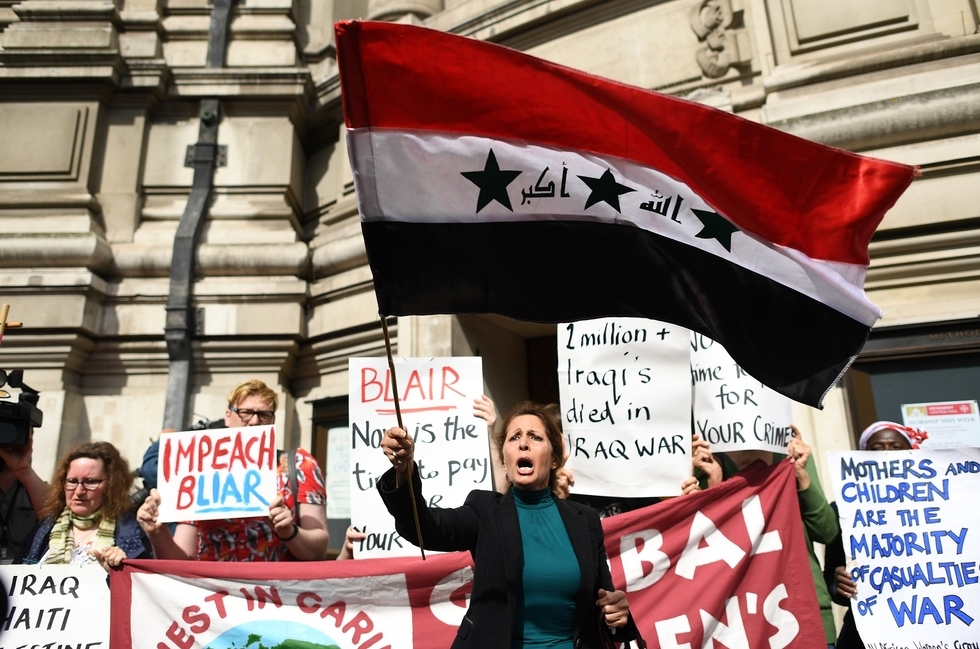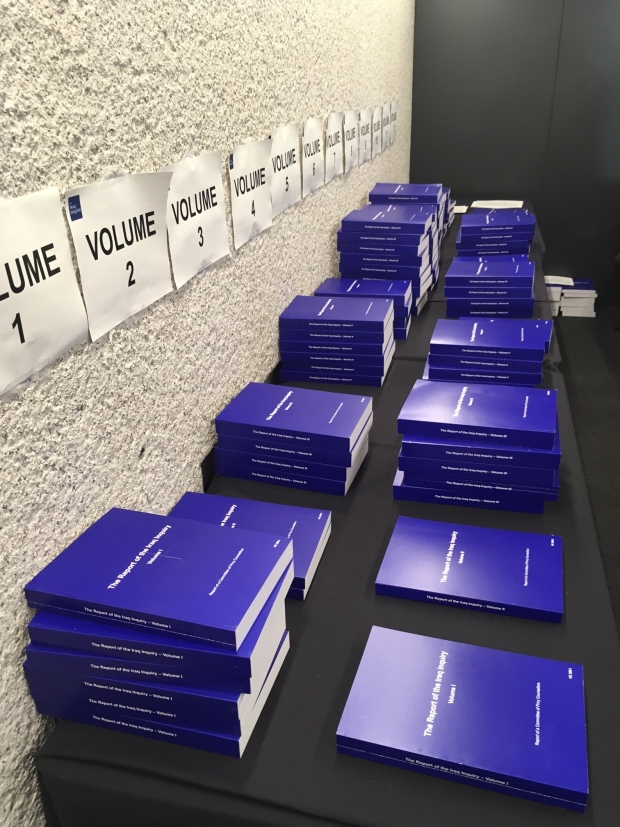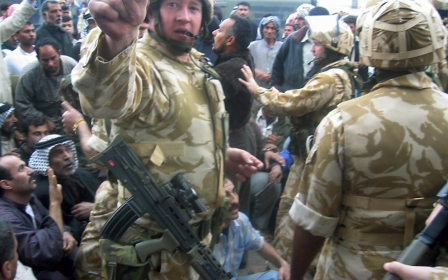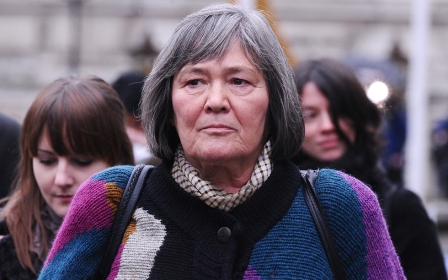Chilcot delivers damning verdict on Blair and spy chiefs for disaster in Iraq

Tony Blair led Britain into an unnecessary war in Iraq on the basis on flawed intelligence and without planning for the aftermath of toppling Saddam Hussein, the Chilcot report found on Wednesday.
In a damning judgment of the former prime minister and the British establishment, Sir John Chilcot’s report concluded Blair decided to back the US-invasion of Iraq before the “peaceful options for disarmament had been exhausted” and that military action was not being used as a last resort. The war did not need to be fought, the report said.
Sir John Chilcot's report, which runs to 2.6m words and 12 volumes, also offered fierce criticism of the UK's Joint Intelligence Committee (JIC) which advised Blair.
The report concluded that JIC presented the threat posed by Saddam's weapons of mass destruction (WMD) “with a certainty that was not justified” and that despite “explicit warnings” the consequences of the invasion were “underestimated” with disastrous consequences for the 179 British soldiers killed in the conflict and for the Iraqi people.
In one of the most damning revelations in the report, which examined more than 150,000 official and declassified government documents, are previously unseen notes between Blair and former President George W Bush showing that Blair gave the US leader an assurance that he would be with him “whatever” to stand up to Saddam’s “brutal and inhumane” regime.
LIVE BLOG: Chilcot as it happens
Blair, the documents reveal, had backed a “clever strategy” for regime change in Iraq as early as December 2001.
The vast report, which is still being digested, also found:
- The decision to commit British troops to war was made by Blair alone and without a formal Cabinet decision.
- Blair’s own foreign policy advisers told him to tone down his support for regime change in private letters to Bush.
- Britain went to war while weapons inspectors were making progress in Iraq in a move that undermined the authority of the UN and international law.
- The precise basis on which Blair advised his cabinet the war was legal is “not clear” and the legal circumstances were “far from satisfactory”.
- Blair had been explicitly warned that the invasion of the Iraq would increase the threat from al-Qaeda in the UK and in Iraq.
- He was also warned of the risks of internal strife in Iraq and the role Iran and al-Qaeda would likely play in destabilising the country.
However, the report stopped short of labelling the war illegal or calling for the former prime minister to put put on trial for war crimes, in a move that will dismay the families of soldiers killed in Iraq and could prompt accusations of a “whitewash”.
Blair said in a statement that he would take "full responsibility for any mistakes without exception or excuse", but stated he took the decision for war "in good faith and in what I believed to be the best interests of the country" and disputed claims his actions had contribted to the destabilisation of Iraq and the wider Middle East.
At a news conference this morning, Chilcot said: "The questions for the inquiry were whether it was right and necessary to invade Iraq and whether the UK could and should have been better prepared for what followed.
"The UK chose to join the invasion before peaceful options for disarmamaent were exhausted."
Sir John Chilcot’s report, officially known as the Iraq Inquiry, has taken seven years to report and was set up by former prime minister Gordon Brown in 2009 to “learn the lessons” of the Iraq war.
Sir John roundly condemned Blair’s government for its reliance on flawed intelligence and failure to properly plan for the aftermath of the invasion.
Oborne on Chilcot: ‘He has done his job. It is not a let down’
The report will be seen as placing much of the blame for the conflict at Blair’s feet, after Chilcot said the decision to go to war was “shaped by key choices made by Blair’s government” during the 18-month-long march to war.
During this period, Blair repeatedly backed a “clever strategy” for regime change, newly released diplomatic cables show, and by the time the former prime minister visited George Bush at his Crawford ranch in Texas in early April 2002, official British thinking had undergone “profound change” towards the use of force in Iraq.
Blair’s key adviser, Alastair Campbell, appears to come out the report fairly well, though other key members of Blair’s inner circle and the intelligence community are likely to have faced intense criticism in the pages of the report, which will be poured over in the coming days and weeks.
Chilcot’s report concluded that Blair did seek a partnership to influence Bush to seek a UN mandate for the conflict, but that this was ultimately unsuccessful and the conflict went ahead without international backing or legitimacy.
In a note to Bush in July 2002, after the famous Crawford ranch meeting between the two men in Texas, Blair said: “I will be with you, whatever. But this is the moment to assess bluntly the difficulties. The planning on this and the strategy are the toughest yet. This is not Kosovo. This is not Afghanistan. It is not even the Gulf war.”
In comment that will be seized upon by critics of the war, he added: “The military part is hazardous but I will concentrate mainly on the political context for success.”
Blair went on to state that regime change and getting rid of Saddam Hussein was “the right thing to do” as he was a potential threat.
He said: “He could be contained. But containment… is always risky. His departure would free up the region. And his regime is… brutal and inhumane”.
The Chilcot report also revealed Blair had ignored the advice of his own diplomats during the march to war, citing calls from Sir David Manning, the British ambassador to Washington for Blair to remove the word “whatever” from the crucial July 2002 transatlantic cable.
Sir David, who advised Blair to remove the entire first sentence, told Chilcot that the statement, which can be interpreted as offering the US unconditional backing, was “too sweeping”.
Sir John’s report also found that Blair had concluded that the “likelihood was war” by early January 2003, after Bush administration told London that the weapons inspectors deployed to Iraq “would not achieve the desired result”, said Chilcot in his statement on Wednesday morning.
The next month Blair accepted the US timetable for war without any consultation with his cabinet, in a move which will prompt fresh charges that the former prime minister oversaw a “sofa-style of government”.
Sir John also said that on the eve of war the final decision to invade was also made “without evidence of major new Iraqi violations” in a move that “undermined” the authority of the UN Security Council.
In comments that will be seized upon by the anti-war campaigners gathered outside the Queen Elizabeth conference centre in central London, where Sir John revealed his report, the former civil servant concluded that the invasion went ahead when “there was no imminent threat from Saddam Hussein”.
He also added that the previous strategy of “containment could have been adopted and continued for some time”, amid suggestions that the weapons inspectors had been making progress and expected “further co-operation” from Saddam Hussein’s government.
Chilcot also made sweeping attacks on Britain’s preparedness for war and the pre-conflict planning, which he blamed on Blair’s failure to “establish clear ministerial oversight of UK planning and preparation.”
In some of the sharpest criticism of the former prime minister, Sir John, said: “He did not ensure there was a flexible, realistic and fully resourced plan that integrated UK military and civilian contributions, and address the known risks.”
As many as one million Iraqis are thought to have died in the aftermath of the invasion and the civil war that followed.
Sir John added: “The government’s preparations failed to take account of the magnitude of the task of stabilising, administering and reconstructing Iraq, and of the responsibilities which were likely to fall to the UK.”
At a press conference, Blair said that the decision to join the war in Iraq had been the "hardest, most momentous, most agonising decision I took in my 10 years as prime minister" and said he took "full responsibility" for the consequences.
But he added: "It’s claimed by some that by removing Saddam we caused the terrorism today in the Middle East. And it would be better to keep him in power. I profoundly disagree. Saddam was himself a wellspring of terror, a threat to peace and his own people. If he had been left in power in 2003, then I believe he would have once again threatened world peace and when the Arab revolutions of 2011 began, he would have [fought off change]…with the same deadly consequences that we see in Syria today.
"Whereas at least in Iraq, with all of its challenges, we have today a government that is elected, recognised as internationally legitimate and is fighting terrorism. The world was, and is in my judgment, a better place without Saddam Hussein."
Chilcot’s report shows that Blair was repeatedly warned that the invasion of Iraq would give succour to al-Qaeda and other Islamist militants.
According to the report the JIC told him in early February 2003, one month before British tanks rolled into southern Iraq, that the invasion would “increase” the threat to the UK and in Iraq,
He was also warned by the JIC that al-Qaeda and other militants would likely become more active in central Iraq and would set up “sleeper cells” in Baghdad to be “activated by a US occupation".
In a declassified JIC cable, that will see some critics make links to the bombing of Tube trains and a bus in London in July 2005, Blair was told that the threat from “Islamist terrorists will also increase in the event of war, reflecting intensified anti-US/Western sentiment in the Muslim world, including among Muslim communities in the West”.
In an earlier statement, Blair said he disagreed that his actions had led to an increase in terrorism in the Middle East, and insisted it cleared him of improper use of intellgence, deception of his cabinent and a "secret commitment" to war.
Jumping the gun? Dissecting Blair's written statement on Chilcot
“The report should lay to rest allegations of bad faith, lies or deceit. Whether people agree or disagree with my decision to take military action against Saddam Hussein; I took it in good faith and in what I believed to be the best interests of the country.
"The report finds clearly... there was no falsification or improper use of intelligence... no deception of Cabinet... No secret commitment to war whether at Crawford Texas in April 2002 or elsewhere.
"The inquiry does not make a finding on the legal basis for military action but finds that the Attorney General had concluded there was such a lawful basis by 13th March 2003."
The statement noted that Chilcot makes "real and material criticisms of preparation, planning, process and of the relationship with the United States".
"These are serious criticisms and they require serious answers. I will respond in detail to them later this afternoon.
"I will take full responsibility for any mistakes without exception or excuse.
"I will at the same time say why, nonetheless, I believe that it was better to remove Saddam Hussein and why I do not believe this is the cause of the terrorism we see today whether in the Middle East or elsewhere in the world."
New MEE newsletter: Jerusalem Dispatch
Sign up to get the latest insights and analysis on Israel-Palestine, alongside Turkey Unpacked and other MEE newsletters
Middle East Eye delivers independent and unrivalled coverage and analysis of the Middle East, North Africa and beyond. To learn more about republishing this content and the associated fees, please fill out this form. More about MEE can be found here.




